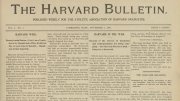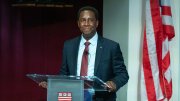Sergio Troncoso ’83 showed up in Cambridge in 1979 with a suitcase full of T-shirts brought from his hometown on the Texas-Mexico border. But cold weather was not the only aspect of undergraduate life he was unprepared for. “I literally felt like an alien in Harvard Yard,” recalls the award-winning author, who is now working on his second novel.
Troncoso’s culture shock led him to study Mexican politics in order to explore his suddenly very distinctive origins. “The disgrace of Texas education is that I knew almost nothing about Mexican history,” he says.
After college, he won a Fulbright that took him to Mexico to continue studying that country’s political economy; then he returned to earn a master’s from Yale in international relations. But increasingly, his intellectual attention was drawn elsewhere.
“People thought, ‘He’s going to be a great Mexican scholar,’ but that’s not really what I wanted to do anymore,” Troncoso remembers. Instead, he began a philosophy doctorate at Yale. When he stumbled upon a course called “Philosophy in Literature,” he became fascinated with the intersection of fiction and ideas. He found himself writing more and more fiction in his spare time, staying up late in order to pen short stories. His newfound passion confronted him with a difficult decision: “‘Am I going to write a novel or am I going to write a dissertation?’ I chose to write fiction, and I took my master’s” in philosophy, dropping the plan for a Ph.D. His first published short story, called “Abuelita,” featured his grandmother providing an argument against the teachings of Heidegger. Meanwhile, he taught fiction writing and economics at Yale during the summers as he continued to hone his own writing skills.
Troncoso’s first book, The Last Tortilla and Other Stories, won the 1999 Premio Aztlán Literary Award for best new Chicano writer. His second book, The Nature of Truth, is a psychological thriller set at Yale that was influenced by one of his favorite writer-philosophers, Dostoyevsky. Recently he was finishing the last chapter of what he calls “a big fat novel” set in his hometown of Ysleta. In interviews, he has stressed the importance of his identity as a Chicano in his writing, and his new work questions the nature of home and belonging in modern America, as well as the roots and consequences of immigrant exclusion.
Troncoso says the book also asks, “How do disparate people become a family?” The question, he adds, is particularly relevant to his own life, as his wife, classmate Laura Drachman, an investment banker who is Jewish and grew up in Chicago, comes from a very different background. They met in their junior year, married in 1990, and now live on New York’s Upper East Side with their two sons.
Troncoso writes fiction in the mornings, doing what he calls the “bureaucratic work” of being an author in the afternoons. He has been a director of the Hudson Valley Writers’ Center, a nonprofit organization that holds writing workshops for amateurs and professionals, for seven years; he has invited other Chicano writers to speak at its events and refers to it fondly as a “thriving little place.” He also gives frequent readings, often at universities and libraries back in Texas.
As he looks forward to attending his twenty-fifth reunion in June, Troncoso notes that much has changed since he first felt so painfully different as a freshman. “When I was at Harvard, I was scared and intimidated and I wasn’t sure I belonged,” he says. “After so many years, I still have a lot of doubts and I’m trying to improve, but I guess I feel that there’s a lot of things I’ve accomplished that I didn’t think I would have by this time. I don’t have this sense of being completely lost in an alien environment.”
~Liz Goodwin








